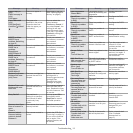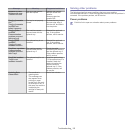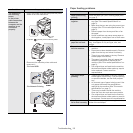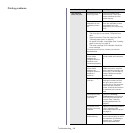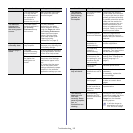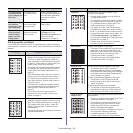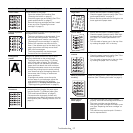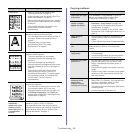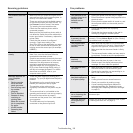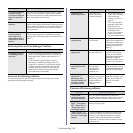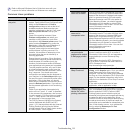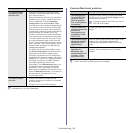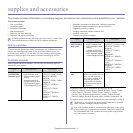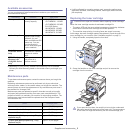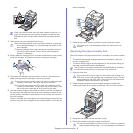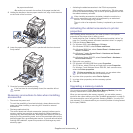
Troubleshooting_ 19
Scanning problems
Condition Suggested solutions
The scanner does not
work.
• Make sure that you place the original to be
scanned face down on the scanner glass, or
face up in the document feeder.
• T
here may not be enough available memory
to hold the document you want to scan. Try
the Prescan function to see if that works.
Try lowering the scan resolution rate.
• C
heck that the machine printer cable is
connected properly.
• Make sure that the machine printer cable is
not defective. Switch the printer cable with a
known good cable. If necessary, replace the
printer cable.
• Check that the scanner is configured
correctly. Check scan setting in the
SmarThru Office or the application you want
to use to make certain that the scanner job
is being sent to the correct port (for example,
USB001).
The unit scans very
slowly.
• Check if the machine is printing received
data. If so, scan the document after the
received data has been printed.
• Graph
ics are scanned more slowly than text.
• Communication speed slows in scan mode
because of the large amount of memory
required to analyze and reproduce the
scanned image. Set your computer to the
ECP printer mode through BIOS setting. It
will help to increase the speed. For details
about how to set BIOS, refer to your
computer user’s guide.
Message appears on
your computer
screen:
• D
evice can’t be
set to the H/W
mode you want.
• Por
t is being used
by another
program.
• Po
rt is Disabled.
• Sc
anner is busy
receiving or
printing data.
When the current
job is completed.,
try again.
• In
valid handle.
• Sc
anning has
failed.
• T
here may be a copying or printing job in
progress. Try your job again when that job is
finished.
• Th
e selected port is currently being used.
Restart your computer and try again.
• The machine printer cable may be
improperly connected or the power may be
off.
• T
he scanner driver is not installed or the
operating environment is not set up properly.
• Ensure that the machine is properly
connected and the power is on, then restart
your computer.
• T
he USB cable may be improperly
connected or the power may be off.
Fax problems
condition suggested solutions
The machine is not
working, there is no
display, or the
buttons are not
working.
• Un
plug the power cord and plug it in again.
• En
sure that there is power being supplied to the
electrical outlet.
• Ensure that the power switch is turned on, and
the soft power switch on the control panel is
pressed.
No dial tone. • Check that the phone line is properly
connected.
• Check that the phone socket on the wall is
working by plugging in another phone.
The numbers stored
in memory do not
dial correctly.
Make sure that the numbers are stored in memory
correctly. Print a Addess Book list (See "Setting
up address book" on page 7).
The original does
not feed into the
machine.
• Make sure that the paper is not wrinkled and
you are inserting it in correctly. Check that the
original is the right size, not too thick or thin.
• Make
sure that the document feeder is firmly
closed.
• The document feeder rubber pad may need to
be replaced. Contact a service representative.
Faxes are not
received
automatically.
• T
he receiving mode should be set to fax.
• Make
sure that there is paper in the tray.
• Check to see if the display shows any error
message. If it does, clear the problem
The machine does
not send.
• Make sure that the original is loaded in the
document feeder or on the scanner glass.
• Check the fax machine you are sending to, to
see if it can receive your fax.
The incoming fax
has blank spaces or
is of poor-quality.
• The fax machine sending you the fax may be
faulty.
• A noi
sy phone line can cause line errors.
• Check your mac
hine by making a copy.
• A
toner cartridge has almost reached its
estimated cartridge life. Replace the toner
cartridge (See "Replacing the toner cartridge"
on page 2
).
Some of the words
on an incoming fax
are stretched.
The fax machine sending the fax had a temporary
document jam.
There are lines on
the originals you
sent.
Check your scan unit for marks and clean it (See
"Cleaning the scan unit" on page 3).



